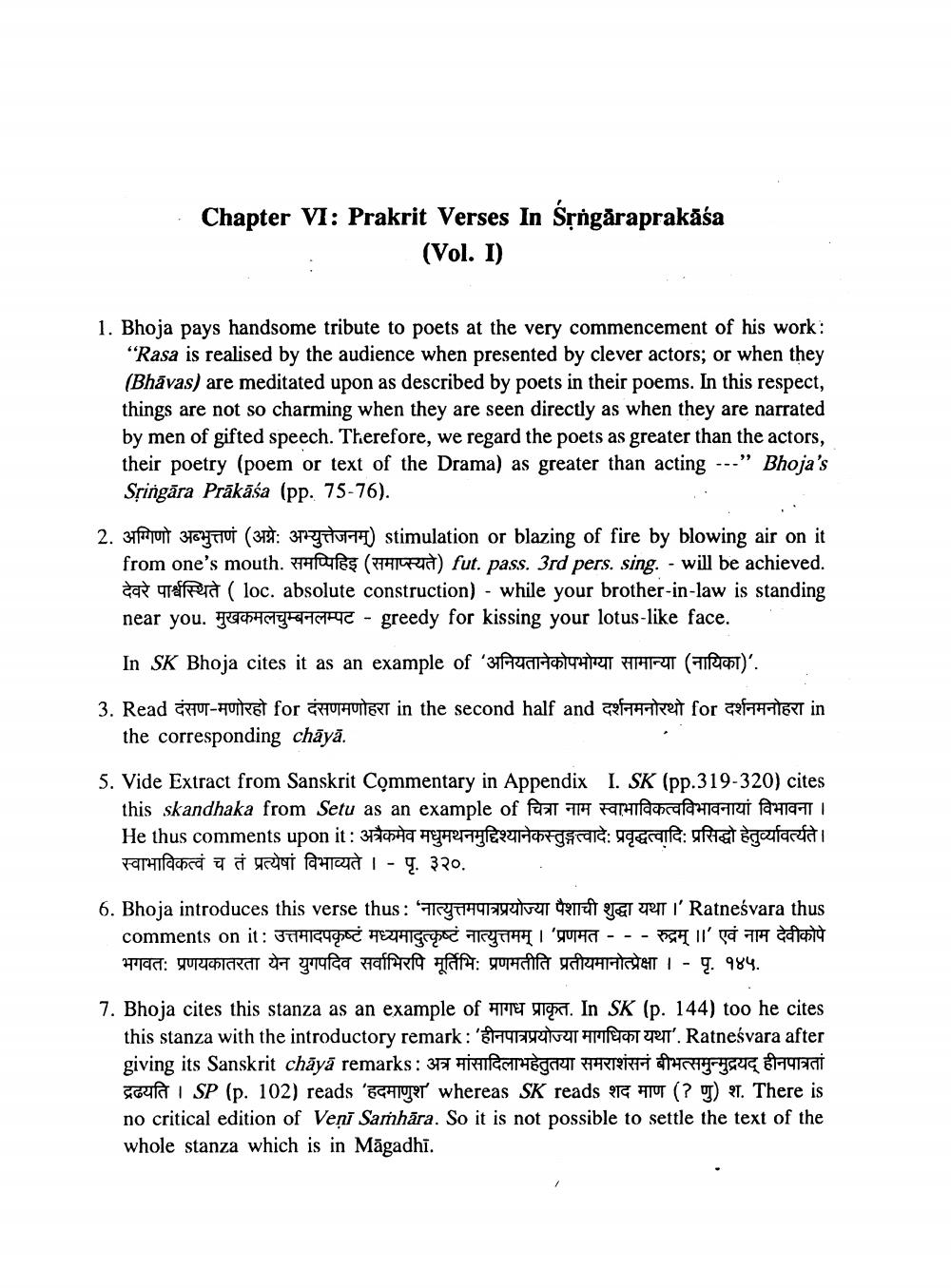________________
Chapter VI: Prakrit Verses In Śrngåraprakāśa
(Vol. I)
1. Bhoja pays handsome tribute to poets at the very commencement of his work:
"Rasa is realised by the audience when presented by clever actors; or when they (Bhāvas) are meditated upon as described by poets in their poems. In this respect, things are not so charming when they are seen directly as when they are narrated by men of gifted speech. Therefore, we regard the poets as greater than the actors, their poetry (poem or text of the Drama) as greater than acting --.” Bhoja's Sringara Prakasa (pp. 75-76).
2. अग्गिणो अब्भुत्तणं (अग्ने: अभ्युत्तेजनम्) stimulation or blazing of fire by blowing air on it
from one's mouth. समप्पिहिइ (समाप्स्य ते) fut. pass. 3rd pers. sing. - will be achieved. देवरे पार्श्वस्थिते ( loc. absolute construction) - while your brother-in-law is standing near you. मुखकमलचुम्बनलम्पट - greedy for kissing your lotus-like face.
In SK Bhoja cites it as an example of 'अनियतानेकोपभोग्या सामान्या (नायिका)'.
3. Read दंसण-मणोरहो for दंसणमणोहरा in the second half and दर्शनमनोरथो for दर्शनमनोहरा in
the corresponding chāyā.
5. Vide Extract from Sanskrit Commentary in Appendix I. SK (pp.319-320) cites this skandhaka from Setu as an example of चित्रा नाम स्वाभाविकत्वविभावनायां विभावना । He thus comments upon it : अत्रैकमेव मधुमथनमुद्दिश्यानेकस्तुगत्वादे: प्रवृद्धत्वादि: प्रसिद्धो हेतुर्व्यावर्त्यते। स्वाभाविकत्वं च तं प्रत्येषां विभाव्यते । - पृ. ३२०.
6. Bhoja introduces this verse thus : 'नात्युत्तमपात्रप्रयोज्या पैशाची शुद्धा यथा।' Ratnesvara thus
comments on it : उत्तमादपकृष्टं मध्यमादुत्कृष्टं नात्युत्तमम् । 'प्रणमत - - - रुद्रम् ।।' एवं नाम देवीकोपे भगवत: प्रणयकातरता येन युगपदिव सर्वाभिरपि मूर्तिभि: प्रणमतीति प्रतीयमानोत्प्रेक्षा । - पृ. १४५.
7. Bhoja cites this stanza as an example of मागध प्राकृत. In SK (p. 144) too he cites
this stanza with the introductory remark : 'हीनपात्रप्रयोज्या मागधिका यथा'. Ratnesvara after giving its Sanskrit chāya remarks : अत्र मांसादिलाभहेतुतया समराशंसनं बीभत्समुन्मुद्रयद् हीनपात्रतां द्रढयति । SP (p. 102) reads 'हदमाणुश' whereas SK reads शद माण (? णु) श. There is no critical edition of Veri Samhāra. So it is not possible to settle the text of the whole stanza which is in Māgadhi.




